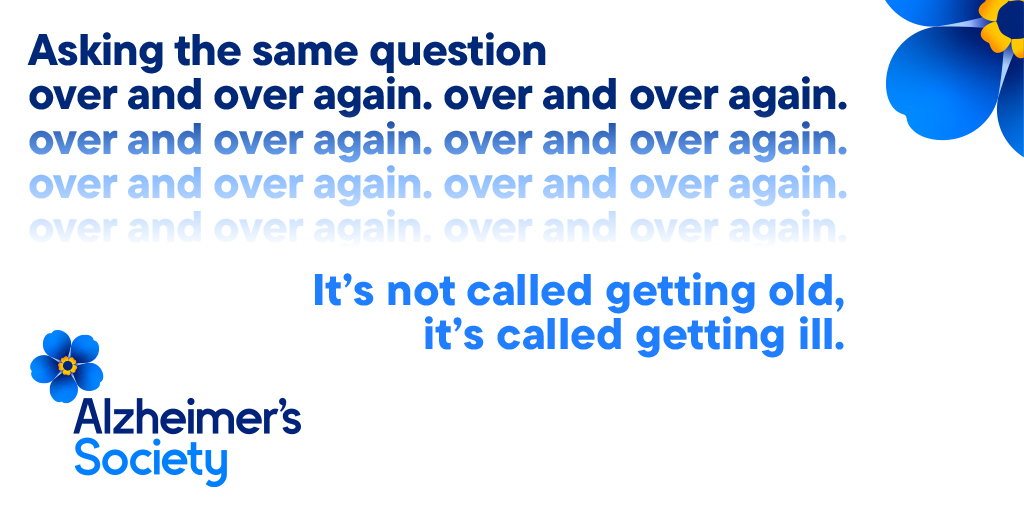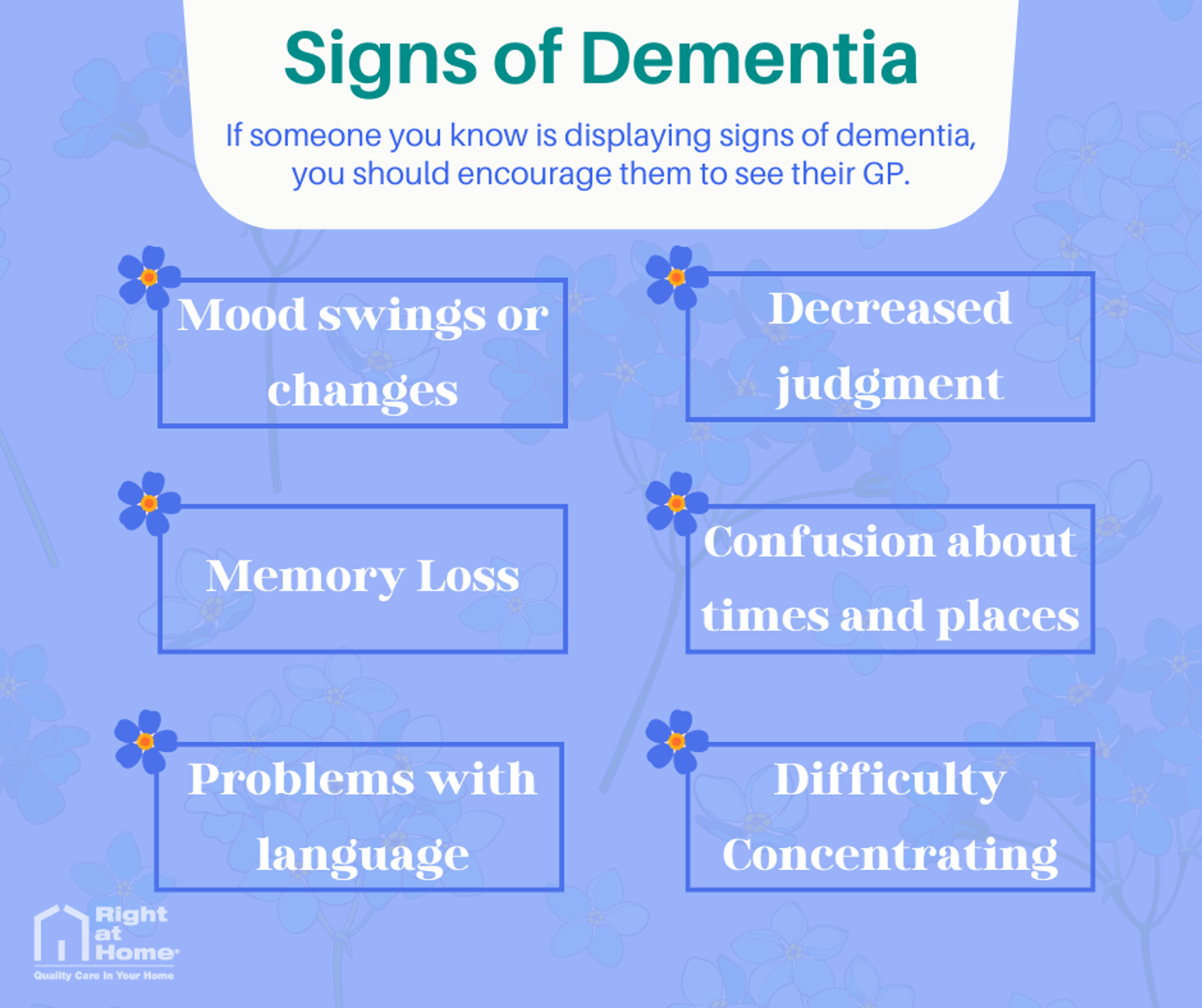Dementia Action Week
Memory loss is not just a part of getting old

Published: 15/05/2023
Dementia Action Week is Alzheimer's Society's biggest and longest running awareness campaign. Last year through this awareness campaign, Alzheimers Society saw a 43% increase in calls to their dementia support line.
This means that it is working, keeping individuals informed on the signs of dementia and creating open communication about it is vital. Let’s help others get the support they need.
What is Dementia?
Dementia is an umbrella term for a set of symptoms that over time can affect someone’s memory, ability to make decisions, cause mood swings, anxiety and/or depression, forgetting time and place, becoming quiet and withdrawn and many other memory, cognitive and communicative symptoms. Unfortunately, there is no cure for dementia yet.
What are the causes of dementia?
Dementia is caused by neurones in the brain not working properly, the disease damages the nerve cells, particularly in the area that affects memory, thinking and speaking. It is a progressive condition that is not a natural part of aging, being progressive means that it will get worse over time and as it progresses new symptoms can be experienced. However, it is not clear who will and won’t get dementia but factors such as age, genes, lifestyle and health conditions can play a role.
Chances of getting dementia can be increased by poor diet, smoking, drinking alcohol, hearing loss, a reduced physical activity and high blood pressure. There is evidence to suggest that during the ages of 40 – 65, there are things an individual can do to reduce the risk of dementia.

How many types of Dementia are there?
There are over 200 subtypes and it is also possible to have two types of the main dementia categories- i.e. it is common to have Alzheimer’s Disease with Vascular Dementia, this means that the individual can experience a mixture of symptoms associated with those types of Dementia.
The Alzheimer’s society state there are 4 types of Dementia:
1. Alzheimer’s disease – this is the most common type of dementia. The first sign of Alzheimer’s being memory loss. A build up of protein in the brain damages the cell s ability to transmit messages. Symptoms get worse over time, these include difficulty remembering recent events, poor concentration, confusion, disorientation, slow or muddled speech, difficulty with everyday tasks and more. Medication can slow its progression but there is no cure for Alzheimer’s Disease.
2. Vascular Dementia- the second most common type of dementia. It is caused by problems in the supply of blood to the brain, often caused by strokes or mini strokes- TIAs. The first signs of vascular dementia being problems planning and organising, making decisions and problem solving. Although similar to Alzheimer’s Disease symptoms, Vascular Dementia can also have specific problems such as sudden changes in mood, difficulty with walking and difficulty controlling the bladder.
3. Dementia with Lewy Bodies- DLB for short, it is closely related to Parkinson's. It is a progressive condition that affects movement and motor control. Memory is less affected compared to other types of Dementia, symptoms of DLB include prone to falls, tremors, delusions, difficulty staying focused, disrupted sleep and trouble swallowing.
4. Frontotemporal Dementia- as we previously wrote about FTD in an article following on from Bruce Willis' diagnosis, we discussed this less common type of dementia that affects the frontal lobes of the brain. Symptoms include changes to personality and behaviour and/or difficulty with language. Frontotemporal Dementia is also called Picks Disease.
Dementia UK | What is Dementia?"By 2025, it’s estimated that over one million people in the UK will have a diagnosis of dementia – and almost all of us will know someone living with the condition.”"
Living with dementia:
As mentioned, dementia is caused by nerve cells in the brain not functioning properly. Depending on the areas of the brain the nerve cells are damaged, the signs and symptoms will present differently, if you have met one person with dementia, you have only met one person with dementia, it effects everyone differently.
Here you can read our article supporting someone with dementia: Frontotemporal Dementia, what is it and how do we support our loved ones with their diagnosis? | Right at Home
The brain is made up of 4 lobes: frontal, temporal, parietal and occipital. Depending on which area of the brain the nerve cells are damaged will depend on how a person with dementia experiences it:
Frontal lobes:
- emotional expression
- personality
- problem-solving
- judgement
- motor function
- language- some individuals may struggle to find the right words when talking to you
- motivation- apathy can cause individuals to lose motivation to do things they would normally enjoy and find meaningful
- social behaviour
Parietal lobes control:
- learnt skills such as reading, writing, calculations and driving
- object recognition
- spatial awareness
Temporal lobes:
- memory- some individuals may begin to find it difficult to recall events that have happened recently
- speech
- language comprehension- some individuals may struggle to follow a conversation
- auditory (hearing) and visual perception
- emotional responses
- face recognition
Occipital lobes control:
- spatial awareness- dementia can cause difficulties processing 3D objects, this can make it difficult to use stairs, park a car or recognise objects
- colour recognition
- object recognition- an individual may misidentify objects such as looking at a remote control and think it is a mobile phone
- hand-eye coordination- such as picking up items
Getting diagnosed
First things first, if you are worried that you or someone you know is showing signs of dementia, call your GP. They will rules out any other conditions that could be displaying signs similar to dementia.
Once these conditions have been ruled out, the GP may refer on to specialist memory assessment team for further tests and to professionals that specialise in a diagnosis.
The importance of getting diagnosed means that there is an explanation for symptoms and allows yourself or someone you know to have access to treatment, advice and support. A prompt diagnosis will help you understand the type of dementia it is and allows for plans for the future to be put in place especially as the dementia progresses and symptoms change over time.
Further Support and information:
Alzheimer's Society (alzheimers.org.uk)
Specialist support to families facing dementia | Dementia UK
What is an Admiral Nurse? | Dementia UK | Specialist dementia nurses
We can support you and/or your loved with dementia at home:

